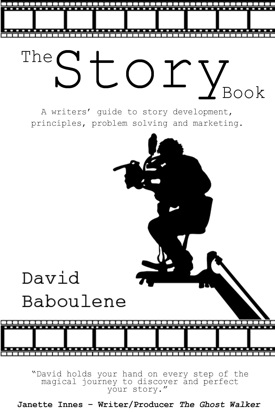 Today we’ve got a guest post from UK author David Baboulene who’s here to talk about something dear to all of us: writing.
Today we’ve got a guest post from UK author David Baboulene who’s here to talk about something dear to all of us: writing.
He’s a published author of two humorous books, two children’s books and The Story Book — an academic work on story theory. He also has three film production deals, two in Hollywood and one in the UK.
He works as a story consultant with training and development organisations, aspiring and established writers and producers. He is also working at Brighton University on his Ph.D. on the critical importance of subtext to a story’s power. David writes extensively on his subject, including his monthly column in Writing Magazine and Writers’ News.
You can find him on the web at http://www.baboulene.com.
My Story, My Way
The most obvious difference I see between the successful writers I have met and the aspiring writers who fail is confidence. Confident writers are focused and productive. They say, “This is MY story. I’m writing it MY way, and I don’t care what anyone thinks.” They put their blinkers on, they get busy, do what they think is right, and deliver. The final product may sell a million, or the writer might end up having thirty copies printed for his own bookshelf, and go back to his day job. Either way, he did it right.
Well, almost…
The wrong thing to do, which I see a lot in the writers I work with, is to go on endless courses or read a pile of books on ‘How to Write’. They inevitably provide you with a set of rules that seems to apply to famous stories. As soon as you buy into this, your story becomes driven by structure. It becomes a little unnatural and it loses its spark, and you have your creative instinct damaged by someone else’s rules.
In my experience, when I get writers to sit down and think about what they are really looking for, it’s not ‘How to Write’ help. You learned how to write when you were at school. The questions they really want answering are: “How do I make the most of my story ideas? How do I tell my story to its absolute best? How do I guide my ability to tell stories without damaging my natural talent? It takes me months to find out what’s bugging me in my story. How do I understand and solve story problems quickly and effectively? What gives one story power and another one not? What are the story tools that are available to writers that make stories grip and intrigue?”
There is only one person who can tell your story the right way, and that is YOU! What you need is knowledge of the craft of story so you are empowered to tell your story your way. Then you will also have the confidence to send it off, take rejection knowing that what you’ve done is right.
Because there’s only one right way to write your story, and that’s your way. If you think about it, there simply can’t be any other way. So take responsibility. Learn about story so you can squeeze the most from your ideas. Write every day, and say to yourself every day:
“My Story. My Way. And balls to the lot of you.”
Say it now. Say it out loud and mean it. Not only will you laugh at yourself, but take responsibility for your own development and suddenly life as a writer, and your path forwards from today, becomes very clear indeed…
And if it’s not clear, contact me and I will send you a free chapter from The Story Book on the topic that is puzzling. Unless your puzzled by `How to Write`. In which case, you`d better find someone else…!





Most people know how to write but a lot fewer know how to make a compelling story that people want to read. 🙂
Well said Jen. That’s sadly true.
I really liked what Dave had to say here, and it makes me think about my own methods some. It also gives me confidence that I’m doing something right. My recent destruction of my rough draft to be completely rewritten has me second guessing myself. I feel like I’m doing the right thing about making it a lot more exciting, but then I wonder why I did such a terrible job the first time. Maybe I was rusty. It has been over 10 years since I’ve really tried my hand at writing again.
Quick note to thank Lindsay for allowing me to be a part of this wonderful blog.
Can’t resist mentioning on the comments above – it is the understanding of story that removes doubts about whether you’ve done right or wrong in your story. I’ve sat in production meetings where the writers have killed the protagonist and the money men and producers are biting their hands, filled with angst about whether they just alienated the entire audience or totally gripped them. Big name, professional dudes – with NO IDEA whether this is the right or wrong thing to do. They sat shrugging their shoulders at each other waiting for someone who seemed to know what he was doing to make a call.
You have your instinct as a writer, but THIS is where a technical understanding of the craft will bring you certainty and decisiveness in your own work – and allow you, in production/publishing meetings, to stand your ground on story decisions. Well, I think it does. Maybe. I’ll ask someone else and get back to you. Oh I dunno. What do you think?!
😉
Thanks, Lindsay.
David
x
http://www.baboulene.com
Great article, David.
My story, my way … but improved in revision #5. Or is it 6? I lose track. Thank goodness I’m almost done.